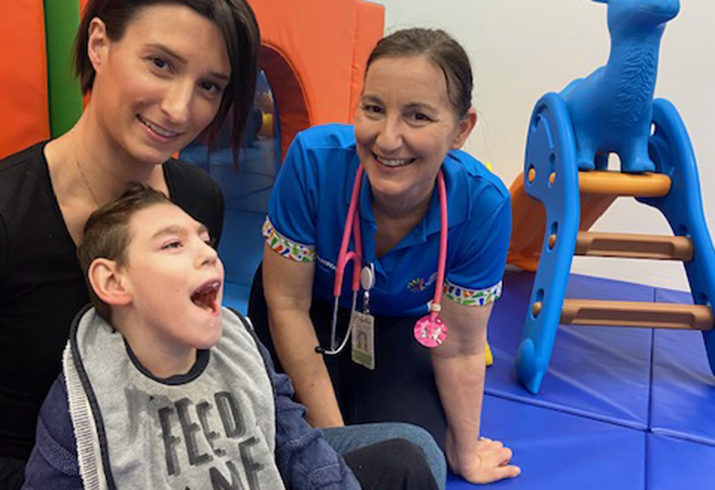Children with cerebral palsy set to breathe easier thanks to ground-breaking research

Children with cerebral palsy (CP) will benefit from ground-breaking new research to recognise the early warning signs of respiratory disease which can have devastating consequences when misdiagnosed.
Until now, little was known about the heightened respiratory risks children living with CP face, with this being the leading cause of unplanned hospital admissions and death around the world.
PCH clinicians are now leading Australian and international efforts to reduce this risk with a recently published ‘consensus statement’, a precursor to clinical guidelines, in the Developmental Medicine and Child Neurology Journal.
The research team believes it will be a game changer in helping drive greater awareness and better management of the risk factors for respiratory illness in children and young people with CP.
The research team responsible includes researchers from the Physiotherapy Department, KidsRehab WA and Respiratory Medicine at PCH in partnership with the Ability Centre and researchers at four of the major paediatric hospitals in Australia – representing an incredible collaboration.
Dr Andrew Wilson, PCH Head of Respiratory Medicine, said the research was prompted by growing concerns about the ‘silent’ nature of this disease where warning signs are often only recognised when it was too late.
The statement has generated a strong response internationally including from the American Academy of Cerebral Palsy and Developmental Medicine who are already promoting it within their practice pathways for clinicians in the US.
Dr Wilson said the team was proud the consensus statement, which included input from an expert panel of more than 100 clinicians, researchers and consumers from around the world, had cemented their reputation as a world leader in this field.
“Our aim through this multi-disciplinary and collaborative approach is to reduce hospital admissions, improve the quality of life and the survival rates of these children. “The response we’ve received reflects the fact we’ve identified a genuine area of need which has been significantly under-researched until now,” Dr Wilson said.
Dr Noula Gibson, Ability Centre Project Lead, said families of children with CP have long reported that respiratory health is a major concern for them.
“We are grateful for the help families have given us in guiding this research and in developing this consensus statement,” Dr Gibson said.
CP is just one of a number of medical conditions that Jo Vernon manages for her seven-year old son Ashton. She said the statement will be helpful for parents like her who manage complex health needs for their children in consultation with a range of health professionals.
“This statement gives me greater security in managing some of Ashton’s health risks, particularly when I’m communicating with others who support him such as his teachers and educational assistants at school,” Mrs Vernon said.
Testing the recommendations from the consensus statement and developing tools to train general practitioners and allied health professionals who work with CP kids, including speech pathologists and physiotherapists, is the next research project the group will tackle thanks to a WA Department of Health research grant.
“Our multi-disciplinary research team will lead a comprehensive rollout of information which I have no doubt will improve our treatment of this lung disease and most importantly help these kids and their families breathe easier,” Dr Wilson said.
The consensus statement was funded through the Cerebral Palsy Alliance Foundation.

